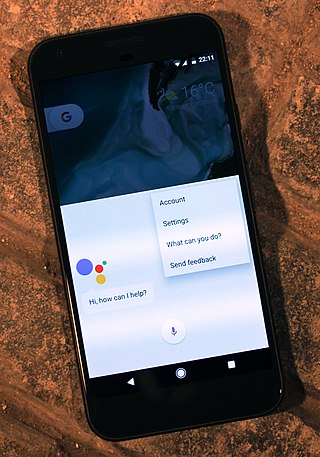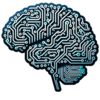Artificial intelligence (AI), in its broadest sense, is intelligence exhibited by machines, particularly computer systems. It is a field of research in computer science that develops and studies methods and software that enable machines to perceive their environment and uses learning and intelligence to take actions that maximize their chances of achieving defined goals. Such machines may be called AIs.
Natural language processing (NLP) is an interdisciplinary subfield of computer science and information retrieval. It is primarily concerned with giving computers the ability to support and manipulate human language. It involves processing natural language datasets, such as text corpora or speech corpora, using either rule-based or probabilistic machine learning approaches. The goal is a computer capable of "understanding" the contents of documents, including the contextual nuances of the language within them. To this end, natural language processing often borrows ideas from theoretical linguistics. The technology can then accurately extract information and insights contained in the documents as well as categorize and organize the documents themselves.

A chatbot is a software application or web interface that is designed to mimic human conversation through text or voice interactions. Modern chatbots are typically online and use generative artificial intelligence systems that are capable of maintaining a conversation with a user in natural language and simulating the way a human would behave as a conversational partner. Such chatbots often use deep learning and natural language processing, but simpler chatbots have existed for decades.
Artificial general intelligence (AGI) is a type of artificial intelligence (AI) that that matches or surpasses human capabilities across a wide range of cognitive tasks. This is in contrast to narrow AI, which is designed for specific tasks. AGI is considered one of various definitions of strong AI.
The following outline is provided as an overview of and topical guide to artificial intelligence:

A virtual assistant (VA) is a software agent that can perform a range of tasks or services for a user based on user input such as commands or questions, including verbal ones. Such technologies often incorporate chatbot capabilities to simulate human conversation, such as via online chat, to facilitate interaction with their users. The interaction may be via text, graphical interface, or voice - as some virtual assistants are able to interpret human speech and respond via synthesized voices.

The Turing test, originally called the imitation game by Alan Turing in 1950, is a test of a machine's ability to exhibit intelligent behaviour equivalent to, or indistinguishable from, that of a human. Turing proposed that a human evaluator would judge natural language conversations between a human and a machine designed to generate human-like responses. The evaluator would be aware that one of the two partners in conversation was a machine, and all participants would be separated from one another. The conversation would be limited to a text-only channel, such as a computer keyboard and screen, so the result would not depend on the machine's ability to render words as speech. If the evaluator could not reliably tell the machine from the human, the machine would be said to have passed the test. The test results would not depend on the machine's ability to give correct answers to questions, only on how closely its answers resembled those a human would give. Since the Turing test is a test of indistinguishability in performance capacity, the verbal version generalizes naturally to all of human performance capacity, verbal as well as nonverbal (robotic).
The following outline is provided as an overview of and topical guide to natural-language processing:
Google Brain was a deep learning artificial intelligence research team under the umbrella of Google AI, a research division at Google dedicated to artificial intelligence. Formed in 2011, it combined open-ended machine learning research with information systems and large-scale computing resources. It created tools such as TensorFlow, which allow neural networks to be used by the public, and multiple internal AI research projects, and aimed to create research opportunities in machine learning and natural language processing. It was merged into former Google sister company DeepMind to form Google DeepMind in April 2023.

DeepMind Technologies Limited, doing business as Google DeepMind, is a British-American artificial intelligence research laboratory which serves as a subsidiary of Google. Founded in the UK in 2010, it was acquired by Google in 2014 and merged with Google AI's Google Brain division to become Google DeepMind in April 2023. The company is based in London, with research centres in Canada, France, Germany, and the United States.
Cognitive computing refers to technology platforms that, broadly speaking, are based on the scientific disciplines of artificial intelligence and signal processing. These platforms encompass machine learning, reasoning, natural language processing, speech recognition and vision, human–computer interaction, dialog and narrative generation, among other technologies.

Braina is a virtual assistant and speech-to-text dictation application for Microsoft Windows developed by Brainasoft. Braina uses natural language interface, speech synthesis, and speech recognition technology to interact with its users and allows them to use natural language sentences to perform various tasks on a computer in most languages of the world. The name Braina is a short form of “Brain Artificial”.
This glossary of artificial intelligence is a list of definitions of terms and concepts relevant to the study of artificial intelligence, its sub-disciplines, and related fields. Related glossaries include Glossary of computer science, Glossary of robotics, and Glossary of machine vision.
Google AI is a division of Google dedicated to artificial intelligence. It was announced at Google I/O 2017 by CEO Sundar Pichai.
Generative Pre-trained Transformer 3 (GPT-3) is a large language model released by OpenAI in 2020.
Meta AI is an artificial intelligence laboratory owned by Meta Platforms Inc.. Meta AI develops various forms of artificial intelligence, including augmented and artificial reality technologies. Meta AI is also an academic research laboratory focused on generating knowledge for the AI community. This is in contrast to Facebook's Applied Machine Learning (AML) team, which focuses on practical applications of its products.
LaMDA is a family of conversational large language models developed by Google. Originally developed and introduced as Meena in 2020, the first-generation LaMDA was announced during the 2021 Google I/O keynote, while the second generation was announced the following year. In June 2022, LaMDA gained widespread attention when Google engineer Blake Lemoine made claims that the chatbot had become sentient. The scientific community has largely rejected Lemoine's claims, though it has led to conversations about the efficacy of the Turing test, which measures whether a computer can pass for a human. In February 2023, Google announced Bard, a conversational artificial intelligence chatbot powered by LaMDA, to counter the rise of OpenAI's ChatGPT.

In the field of artificial intelligence (AI), a hallucination or artificial hallucination is a response generated by AI which contains false or misleading information presented as fact. This term draws a loose analogy with human psychology, where hallucination typically involves false percepts. However, there is a key difference: AI hallucination is associated with unjustified responses or beliefs rather than perceptual experiences.

Generative pre-trained transformers (GPT) are a type of large language model (LLM) and a prominent framework for generative artificial intelligence. They are artificial neural networks that are used in natural language processing tasks. GPTs are based on the transformer architecture, pre-trained on large data sets of unlabelled text, and able to generate novel human-like content. As of 2023, most LLMs have these characteristics and are sometimes referred to broadly as GPTs.






